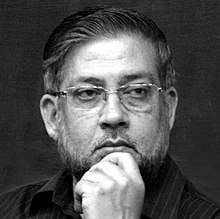Raghavendra Gadagkar
Raghavendra Gadagkar is a full professor at the Centre for Ecological Sciences, Indian Institute of Science in Bangalore, India, who studies evolution of social behaviour using eusocial insects using Ropalidia marginata, a locally common wasp as a model. He was, from 2014 to 2016, the president of the Indian National Science Academy.
Raghavendra Gadagkar | |
|---|---|
 Raghavendra Gadagkar | |
| Born | 28 June 1953 |
| Nationality | India |
| Known for | sociobiology, eusociality |
| Awards |
|
| Scientific career | |
| Fields | Biologist |
| Institutions | Indian Institute of Science |
| Influences | E. O. Wilson[2] |
| Website | http://ces.iisc.ernet.in/hpg/ragh/ |
Gadagkar has published over 275 scientific papers and articles in various international journals as well as in Indian journals like Current Science magazine, and the Journal of Biosciences (India), both published from Bangalore. His most important contribution to the field of evolution of eusociality is the theory of "assured fitness returns" which has been verified from empirical data [3] and can be considered as a significant landmark in this field since the seminal work done by W. D. Hamilton in 1964. Over the last three decades he has established an active research group that has contributed towards understanding the proximate and ultimate factors of social evolution in wasps. Some of his opinionated articles on science policy have been controversial, such as his exception to the pay to publish, free to read Open Access science publishing model.[4]
His first book, Survival Strategies,[5] has been translated into Chinese and Korean. It uses simple language to explain recent advances in behavioural ecology and sociobiology to a general audience.
He has also written a more technical book, The Social Biology of Ropalidia marginata: Towards understanding the evolution of eusociality,[6] which puts together over twenty years of his research about the evolution of eusociality.
Since 2002 he is a Non-resident Permanent Fellow[7] at the German institute Wissenschaftskolleg zu Berlin.[8]
In 2006 Gadagkar became one of the very few Indian scientists to be elected as a Foreign Associate of the National Academy of Sciences, USA. He has won numerous awards for his contributions to science research including Cross of the Order of Merit (Germany)[9] in 2015, the Shanti Swarup Bhatnagar Award in Biology in 1993 and the TWAS Prize in 1999.[10]
He holds a number of other academic positions. He is the founding chairman of the Centre for Contemporary Studies, IISc, Bangalore. He is an honorary professor at the Jawaharlal Nehru Centre for Advanced Scientific Research and at the Indian Institute of Science Education and Research, Kolkata. He is a Non-resident Permanent fellow of Wissenschaftskolleg zu Berlin. He is a chairman of Research Council for History of Science, Indian National Science Academy, New Delhi. He was elected as a member of the German National Academy of Sciences Leopoldina in July 2012.
In 2004, Gadagkar pioneered the establishment of the Centre for Contemporary Studies [11] in the Indian Institute of Science. This department is a platform for bringing together the natural and social sciences for a discourse of mutual benefit.
References
- German Mission in India
- (Michael L. Lewis 2003, p. 128) "Gadagkar has clearly been influenced by Wilson's writings"
- Gadagkar, Raghavendra (November 2001). The Social Biology of Ropalidia. Harvard: Harvard University Press. p. 400. ISBN 978-0-674-00611-9.
- Gadagkar, Raghavendra (21 May 2008). "Open-access more harm than good in developing world". Nature. 453 (7194): 450. Bibcode:2008Natur.453..450G. doi:10.1038/453450c. ISSN 1476-4687. PMID 18497797.
- Gadagkar, Raghavendra (May 2001). Survival Strategies - Cooperation and Conflict in Animal Societies. Harvard: Harvard University Press. p. 212. ISBN 978-0-674-00611-9.
- Gadagkar, Raghavendra (November 2001). The Social Biology of Ropalidia. Harvard: Harvard University Press. p. 400. ISBN 978-0-674-00611-9.
- Non-resident Permanent Fellows at Wissenschaftskolleg zu Berlin
- Wissenschaftskolleg zu Berlin
- "Germany's highest civilian honour conferred on Indian professor". The Times of India. 7 August 2015. Retrieved 9 August 2015.
- "Prizes and Awards". The World Academy of Sciences. 2016.
- CCS
- Michael L. Lewis (2003). "Modern Ecology Comes to India". Inventing Global Ecology: Tracking the Biodiversity Ideal in India, 1947-1997. Ohio University Press. ISBN 978-0-8214-1540-5.CS1 maint: ref=harv (link)
External links
| Wikiquote has quotations related to: Raghavendra Gadagkar |